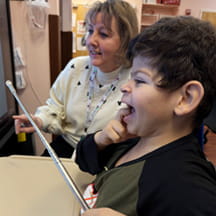When it comes to adult congenital heart disease (CHD) patients, Edward Hickey doesn't mince words.
"Historically, adult congenital heart disease patients have had a very raw deal," says Hickey, M.D., surgical director, Adult Congenital Heart Program, Texas Children's Hospital in Houston. "This is the main pet peeve in my professional life—the fact these young adults get such a raw deal compared to those in any other branch of medicine."
Hickey and his colleagues at Texas Children's are hoping to mitigate this "raw deal" with the launch of its new adult congenital heart disease center.
Center designed with focus on adult patients
The hospital opened the new 27,000-square-foot unit late 2020. Although Texas Children's has treated adult CHD patients since 2004, the creation of a dedicated center marks a greater emphasis on providing lifelong care for this growing population.
In addition to larger furniture, fixtures and spaces designed to accommodate its adult patients, Texas Children's built an outpatient clinic, diagnostics labs and a cardiac rehabilitation gym into the adult CHD unit. An inpatient unit launched in January 2021, complete with 16 universal care beds—meaning patients don't need to move from room to room as their condition changes throughout their stay.
"So often these patients felt like a round peg in a square hole," says Peter Ermis, M.D., medical director, Adult Congenital Heart Program. "They've never felt like a priority, and I think that's what's different here—it's their home, and that's reassuring in so many ways."
Long-term care essential to improved outcomes
A center committed to care for adult CHD patients is a novel approach, but one that Hickey and Ermis say underscores the importance of care continuity for CHD patients. About 1% of children are born with a CHD, and thanks to advances in care, the vast majority now survive into adulthood. But that's typically where CHD-focused care falls off—Ermis says only about 4% to 5% of patients maintain their cardiac care in adult congenital heart defect programs.
"The transition is so vital," Ermis says. "From day one, we have to drive home the idea that lifelong care is important and getting that lifelong care in a center that focuses on congenital heart disease is vital."
Center provides a lifetime medical home for CHD patients
Among the roughly 95% of adults with CHD who are not under the care of a dedicated adult CHD program, many are cared for by adult cardiac providers. But the expertise of those providers lies primarily in treating adults with acquired heart diseases rather than adults living with CHDs—CHD patients typically comprise a very small percentage of an adult cardiologist's patients, according to Hickey.
And there's a large population of adults with CHD who just don't successfully make the transition from childhood to adult care for their heart conditions. The reasons can vary—lack of appropriate adult providers, difficulty in building trust and communication with a new care team or simply young adults failing to maintain a care plan.
But Hickey and Ermis hope preserving continuity by providing a lifelong CHD medical home can help those patients get the care they need.
"Today, when a newborn is diagnosed with a congenital heart condition, I can look their parents in the eye and say that Texas Children's Hospital is your home for life," Hickey says. "You never need to leave—even when they go off to college and everything else, we're your home for congenital heart disease for life."




